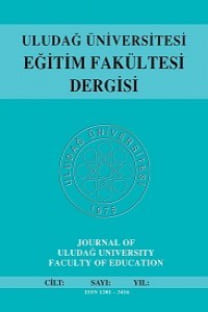Yönetici İşlevlere Yönelik Davranış Değerlendirme Envanterinin (YİYDDE) Birleştirilmiş Klinik Bir Türk Örnekleminde Psikometrik Geçerliliğinin Ön Değerlendirmesi
Nöropsikolojik değerlendirme, YİYDDE, Yönetici işlevler, Güvenilirlik, Geçerlilik
An Initial Evaluation Of Psychometric Validity Of Behavioral Rating Inventory Of Executive Function (Brief) In A Turkish Combined Clinical Sample
-,
___
- Anderson, V., 2001. Assessing executive functions in children: Biological, psychological, and developmental considerations. Pediatric Rehabilitation, 4(3),119-136.
- Anderson, V. A., Anderson, P., Northam, E., Jacobs, R. ve Catroppa, C., 2001. Development of executive functions through late childhood and adolescence in an Australian sample, Developmental Neuropsychology, 20(1), 385-406.
- Baron, I. S., 2004. Neuropsychological evaluation of the child. New York: Oxford University Press.
- Barkley, R.A. 1997. ADHD and the nature of self-control. New York: Guilford.
- Brocki, K. C. and Bohlin, G., 2004. Executive functions in children aged 6 to 13: A dimensional and developmental study. Developmental Neuropsychology, 26(2),571-593.
- Chandler, J. (n.d). Executive Functioning. Retrieved November 08, 2010, from functioning/Executive%20Functioning.htm
- Denckla, M. B., and Reiss, A. L., 1997. Prefrontal-subcortical circuits in developmental disorders. In N. A. Krasnegor, G. R. Lyon, and P. S. Goldman-Rakic (Eds.), Development of the prefrontal cortex: Evolution, neurobiology, and behavior (pp. 283-293). Baltimore: Paul.
- D’Esposito, M. and Gazzaley, A., 2006. Neurorehabilitation of executive function. In M. E. Selzer, L. Cohen, F. H. Gage, S. Clarke and P. W. Duncan (Eds.), Neural rehabilitation and repair (pp. 475-487). Cambridge University Press: Cambridge, U.K.
- Fuster, J. M.,1997. The Prefrontal cortex: Anatomy, physiology, and neuropsychology of the frontal lobe (3rd ed.). New York: Lippincott Williams & Wilkins.
- Geisinger, K. F., 1994. Cross-cultural normative assessment: Translation and adaptation issues influencing the normative interpretation of assessment instruments. Psychological Assessment, 6(4), 304-312.
- Gioia, G. A., Isquith, P. K., Guy, S. C. and Kenworthy, L., 2000. BRIEF: Behavioral rating inventory of executive function professional manual. Odessa, Florida: Psychological Assessment Resources.
- Goldberg, E., 2001. The executive brain: Frontal lobes and the civilized mind. New York: Oxford University Press.
- Helland, T and Asbjornsen, A., 2000. Executive functions in dyslexia. Child Neuropsychology, 6(1), 37-48.
- Johnson, G. S., 2009. About brain injury: A guide to brain anatomy. Retrieved November 08, 2010, from http://www.waiting.com/frontallobe.html
- Lezak, M. D.,1995. Neuropsychological assessment: Third edition. New York: Oxford University Press.
- McCloskey, G. and Kaufman, A. S., 2010. Essentials of executive function assessment. Wiley, John & Sons, Incorporated: USA.
- Michaels, A., 2001. Executive functioning. Retrieved November 01, 2010, from http://www.aspennj.org/pdf/information/articles/executive- functioning.pdf
- Morgan, A. B. and Lilienfeld, S.O., 2000. A met analytic review of the relation between antisocial behavior and neuropsychological measures of executive function, Clinical Psychology Review, 20,113-136.
- Offord, D.R., Boyle, M.H., Racine, Y., Szatmari, P., Fleming, J. E., Sanford, M. and Lipman, E. L., 1996. Integrated assessment data from multiple informants, Journal of the American Academy of Child and Adolescent Psychiatry, 35, 1078–1085.
- Öner, N. 1994. Türkiye’de kullanılan psikolojik testler: Bir başvuru kaynağı. İstanbul: Boğaziçi Yayınları.
- Powell, K. B., Voeller, K. S., 2004. Prefrontal executive function syndromes in children, Journal of Child Neurology, 19, 785-797.
- Reiter, A., Tucha, O. & Lange, K. W., 2005. Executive functions in children with dyslexia. Dyslexia, 11(2), 116-131.
- Seidman, L., Biederman, J., Faraone, S. & Weber, W., 1997. Toward defining a neuropsychology of attention deficit hyperactivity disorder: Performance of children and adolescents from a large clinically referred sample. Journal of Consulting & Clinical Psychology, 65, 150-160.
- Skoff, B.F., 1988. The Utility of Neuropsychological Assessments of Mentally Retarded Individuals. In D.C. Russo and J.H. Kedesdy (Eds). Behavioral Medicine with the Developmentally Disabled. New York: Plenum Press, 161-170.
- Stuss, D. T. and Alexander, M. P., 2000. Executive functions and the frontal lobes: A conceptual view. Psychological Research, 63(3-4), 289- 298.
- Stuss, D. T., and Benson, D. F., 1984. Neuropsychological studies of the frontal lobes. Psychological Bulletin, 95, 3–28.
- Tavşancıl, E., 2002. Tutumların ölçülmesi ve SPSS ile veri analizi. Ankara: Nobel Yayınevi.
- Ukena, Y., Hashimoto, S. and Deguchi, T., 2008. The characteristics of executive function in children with mental retardation and developmental disorders: The study by the longitudinal method using the dimensional change card sort. Bulletin of Tokyo Gakugei University, Educational sciences, 59, 183-189.
- Vohs, K. D., and Baumeister, R. F., 2004. Understanding self-regulation. In R. R. Baumeister and K. D. Vohs (Eds.), Handbook of self- regulation: Research, theory and applications (pp. 1–9). NewYork: Guilford Press.
- Welsh, M. C., Pennington, B. F., and Groisser, D. B., 1991. A normative- developmental study of executive prefrontal function in children. Developmental Neuropsychology, 7, 131-149.
- function: A window on
- Zilles, K., 1990. Cortex. In Paxinos, G. (Eds.), The human nervous system 757-852. San Diego: Academic Press.
- Zillmer, E. A., and Spiers, M. V., 2001. Principles of neuropsychology. Belmont, CA: Wadsworth/Thomson Learning. APPENDIX
- Institutions where the participants were recruited
- Name of the institution Diagnostic group
- Nova Special Education And Counseling Center
- Gün Gelişim Special Education And
- Psychological Counseling Center
- Istanbul Mentally Retarded Foundation
- Mild mental retardation
- Private Dünya Psychological Counseling
- and Education Center ADHD-I Dyslexia Başvuru: 8.6.2011
- Yayına Kabul: 18.11.2012
- Yayın Aralığı: 3
- Başlangıç: 1986
- Yayıncı: Bursa Uludağ Üniversitesi Eğitim Fakültesi
Osmanlı Eğitim Sisteminin Modernleşmesi Sürecinde Hiyerarşi
Sınıf Öğretmenlerinin Özel Gereksinimli Öğrencilerin Kaynaştırılmasına İlişkin Görüşleri
Ömür SADİOĞLU, E. Sema BATU, Asude BİLGİN
Hakan Şevki AYVACI, Hasan BAKIRCI, Mehmet YILDIZ
Yansıtıcı Düşünme Ölçeğinin Türkçeye Uyarlanması
Harun ÇİĞDEM, Adile Aşkım KURT
Uygulama Öğretmenlerinin Öğretmenlik Uygulaması Dersine Yönelik Tutum Ölçeği Geliştirilmesi
Hugo'nun Sefiller'inde yapay cehennem
Çevre Farkındalığı- Çevre Tutumu Arasındaki İlişkinin Yapısal Eşitlik Modeli İle Sınanması
